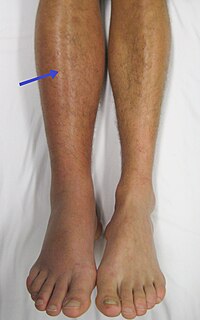
Photo from wikipedia
Importance The guidelines by the National Comprehensive Cancer Network and the American Society for Clinical Oncology recommend the routine use of thromboprophylaxis for patients with gastric adenocarcinoma. However, many physicians… Click to show full abstract
Importance The guidelines by the National Comprehensive Cancer Network and the American Society for Clinical Oncology recommend the routine use of thromboprophylaxis for patients with gastric adenocarcinoma. However, many physicians in Asian countries use venous thromboembolism (VTE) prophylaxis much less often because of the perceived lower VTE incidence in this population. Objectives To evaluate the incidence of postgastrectomy VTE in Korean patients with gastric adenocarcinoma, and to identify the complications and evaluate the efficacy and safety of VTE prevention methods. Design, Setting, and Participants The Optimal Prophylactic Method for Venous Thromboembolism After Gastrectomy in Korean Patients (PROTECTOR) randomized clinical trial was conducted between August 1, 2011, and March 31, 2015. Patients with histologically confirmed gastric adenocarcinoma presenting to a single center (Seoul St Mary’s Hospital in Seoul, South Korea) were enrolled. Patients were randomized to either an intermittent pneumatic compression (IPC)–only group or an IPC+low-molecular-weight (LMW) heparin sodium group. The data were analyzed on intention-to-treat and per protocol bases. Data analysis was performed from April 1, 2016, to October 30, 2017. Main Outcomes and Measures Venous thromboembolism incidence was the primary outcome. Postoperative complications, particularly those associated with VTE prophylaxis methods, were the secondary end point. Results Of the 682 patients enrolled and randomized, 447 (65.5%) were male and 245 (34.5%) were female, with a mean (SD) age of 57.67 (12.94) years. Among the 666 patients included in the analysis, the overall incidence of VTE was 2.1%. The incidence of VTE was statistically significantly higher in the IPC-only group compared with the IPC+LMW heparin group (3.6%; 95% CI, 2.05%-6.14% vs 0.6%; 95% CI, 0.17%-2.18%; P = .008). Among the 14 patients (2.1%) with VTE, 13 were asymptomatic and received a deep vein thrombosis diagnosis, whereas 1 patient received a symptomatic pulmonary thromboembolism diagnosis. The overall incidence of bleeding complications was 5.1%. The incidence of bleeding complications was significantly higher in the IPC+LMW heparin group compared with the IPC-only group (9.1% vs 1.2%; P < .001). No cases of VTE–associated mortality were noted. Conclusions and Relevance Use of IPC alone is inferior to the use of IPC+LMW heparin in preventing postoperative VTE. Because LMW heparin is associated with a high bleeding risk, further study is needed to stratify the patients at high risk for perioperative development of VTE. Trial Registration ClinicalTrials.gov Identifier: NCT01448746
Journal Title: JAMA Surgery
Year Published: 2018
Link to full text (if available)
Share on Social Media: Sign Up to like & get
recommendations!